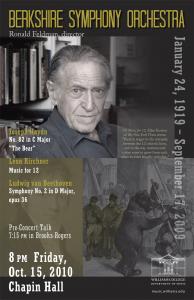
Berkshire Symphony
Fri, October 15th, 2010
8:00 pm
- This event has passed.

Ronald Feldman, director
Pre-Concert Talk at 7:15pm in Brooks-Rogers Recital Hall.
Haydn, Symphony No. 82 in C Major “The Bear”
Leon Kirchner, Music for 12
Beethoven, Symphony No. 2 in D Major, op. 36
The Williams College Department of Music presents the first Berkshire Symphony concert of the season on Friday, Oct. 15, at 8 p.m. in Chapin Hall on the Williams College campus. There is also a pre-concert talk with director Ronald Feldman at 7:15 p.m. in Brooks-Rogers Recital Hall. These free events are open to the public.
Marking the passing of three great American composers who died in 2009, the Berkshire Symphony commemorates their creative lives in three concerts this season.
The first concert features composer Leon Kirchner. Leon Kirchner, who was born just after the end of the first world war and died in 2009, lived a life that spanned almost an entire century: an active and fruitful period of American music. The Berkshire Symphony presents Music for 12. According to Classical Music: The Listener’s Companion by Alexander J. Morin, Music for 12, despite its democratic title, is more of a chamber violin concerto, much like Berg’s in its lyrical sweep.” This is a unique opportunity to hear a work unfamiliar to most audiences.
The Berkshire Symphony is known for its groundbreaking work with contemporary music. Leon Kirchner’s “Music for 12” is framed in this concert by two masterpieces of the 18th and 19th centuries, Haydn’s Symphony No. 82 and Beethoven’s Symphony No. 2. Haydn, who died in 1809, two hundred years before Kirchner, insured his musical immortality with the quality and vast breadth of his output. To hear the Symphony No. 82 in C Major is to marvel at the Haydn’s inspiration: the freshness and vitality belies nothing of the creative effort of composing his previous 81 symphonies. Symphony No. 82 is known as “The Bear”, a name that would have only puzzled Haydn himself. The name was attached to the work much later, perhaps because of its association with dancing bears, a popular form of street entertainment. If nothing else, the whimsical nickname makes this work memorable.
Haydn admired the work of the younger Beethoven, who was a student of the great master. Not a man to stand in anyone’s shadow, Beethoven composed Symphony No. 2 in D Major, opus 36 in 1802 and it was first played in Vienna, which was very much Haydn’s home arena. It seems incredible that this beautiful Symphony No. 2 invited critical vitriol at its premier. Interestingly, the Symphony No. 2 was one of Beethoven’s favorite symphonies.
The Berkshire Symphony is conducted by Ronald Feldman and includes nearly 70 members, half of whom are students and half of whom are professional musicians. The ensemble presents four major concerts each season. In addition to performing the great standards of orchestral repertoire a recurring theme each year is the performance of contemporary works. Championing the works of living American composers has been an integral part of the mission of the Berkshire Symphony.
The final program in the spring features the winners of the Berkshire Symphony Student Soloist Competition. This event is a great showcase for the extraordinary talent at Williams College and is always a highlight of the season.